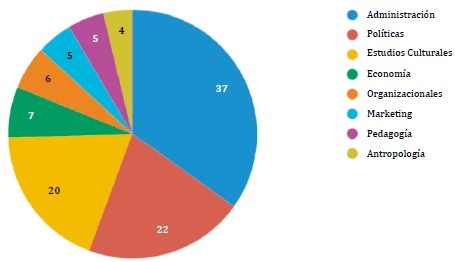The Transorganization as a Structural Answer of Creative Micro-Organizations

Resumen En este artículo se trabaja el concepto transorganización de Eikhof (2014) y se propone como forma para describir a las microorganizaciones creativas que, se plantea, son bastante significativas en el campo de las industrias creativas. A partir de esta contextualización teórica, se propone la autogestión como la estrategia principal que utilizan estas organizaciones para enfrentarse a su contexto ambiguo e incierto, y así poder utilizar la improvisación (Hatch, 1990) desde el flojo acoplamiento de funciones (Douglas y Weick, 1990) como estructuración. Para ello, el trabajo propone los acercamientos teóricos que ha tenido la academia frente al emprendimiento creativo, para centrarse en estos conceptos teóricos según un análisis bibliométrico; posteriormente, estudia el efecto de dichos conceptos desde la economía; presenta la herramienta metodológica utilizada desde un enfoque cualitativo del estudio de caso con observación participante y entrevistas a profundidad; finalmente, hace un estudio de tres casos de microorganizaciones creativas en la música para darle cabida empírica a la propuesta teórica inicial y así llegar a la definición teórica del concepto "autogestión" en el mundo de las organizaciones creativas, que hasta ahora se ha usado empíricamente, pero no en la academia. Clasificación JEL: L22, M14, O14, Z1.
This article is based on the concept of transorganization (Eikhof, 2014) and it is used as a framework to describe creative micro-organizations which are predominant in the field of creative industries. From this theoretical framework, self-management is proposed as the main strategy to be used by these firms in order to face ambiguous and uncertain contexts and thus be able to use organization improvisation (Hatch, 1990) derived from the loose coupling of functions (Douglas & Weick, 1990), as a way of structuration. In order to achieve this, this paper proposes the same theoretical approaches that the academy has used to develop creative entrepreneurship, with a view to focus on these concepts according to bibliometric analysis. Afterwards, the effect of those concepts is analyzed from an economic viewpoint. Later, participant observation and in-depth interviews are used as qualitative methodological tools. Finally, three creative music micro-organization cases are examined to gather empirical data and consequently reach a theoretical definition of the concept of "self-management" in the field of creative organizations theory which has been put into practice without any academic theoretical reference.
Publisher URL: http://www.scielo.org.co/scielo.php
DOI: 6199.22532.9c532c24-5060-4c5a-9d6c-dc2c295c3c86.1698221817
Keeping up-to-date with research can feel impossible, with papers being published faster than you'll ever be able to read them. That's where Researcher comes in: we're simplifying discovery and making important discussions happen. With over 19,000 sources, including peer-reviewed journals, preprints, blogs, universities, podcasts and Live events across 10 research areas, you'll never miss what's important to you. It's like social media, but better. Oh, and we should mention - it's free.
Researcher displays publicly available abstracts and doesn’t host any full article content. If the content is open access, we will direct clicks from the abstracts to the publisher website and display the PDF copy on our platform. Clicks to view the full text will be directed to the publisher website, where only users with subscriptions or access through their institution are able to view the full article.


